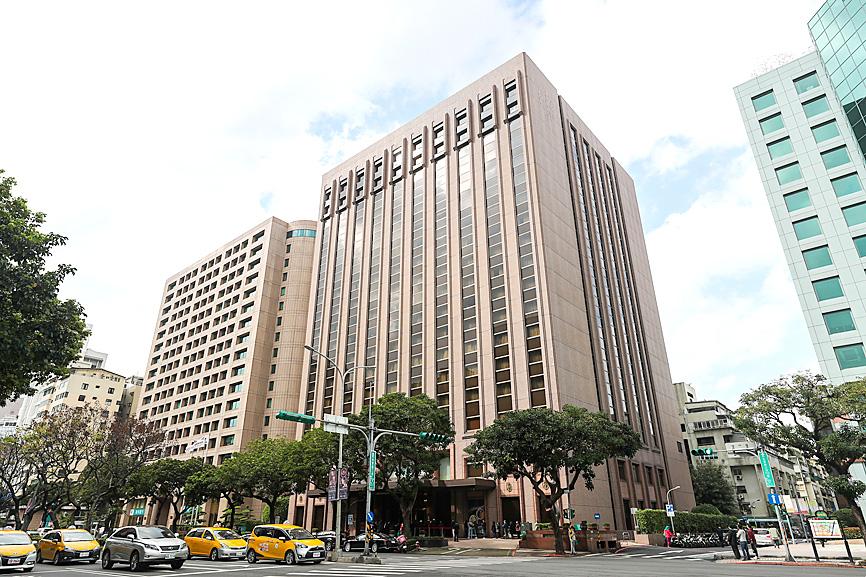The Taipei District Court on Friday threw out a woman’s lawsuit against the now-closed Sherwood Taipei hotel, where she claimed she was injured three years ago after slipping on a wet floor.
The court ruling said that the plaintiff, surnamed Chung (鐘), did not seek medical treatment immediately after falling at the hotel on March 7, 2019, and waited more than a month before visiting a hospital.
Chung, who worked for a technology company, was on her way to a dinner appointment at the hotel when she fell in the lobby, allegedly damaging the cartilage in her left knee, court documents said.

Photo: CNA
She later sued the hotel for NT$5 million (US$168,040 at the current exchange rate) in compensation, claiming that it was liable for her injuries because staff failed to mop up rainwater that had collected in the lobby and did not put up warning signs, it said.
In her filing, Chung said that the NT$5 million figure was calculated based on her medical expenses, the cost of paying for a caretaker during her recovery and her loss of salary over that time.
Sherwood Taipei management testified that Chung was wearing high heels when she slipped, but she got up and did not request medical treatment.
She then stayed for two hours in the restaurant, during which time she did not complain to staff about an injury or of feeling unwell, they said.
When staff called Chung the next day, she said that she had no problem walking, adding that there was no need for concern, they said.
However, on May 8, she contacted the hotel demanding that they pay her NT$5 million for the knee injury, but hotel executives said they believed she might have sustained the injury under other circumstances and declined to pay, court documents said.
In addition to waiting a month before seeking medical treatment, Chung reportedly did not inform a doctor of her fall until two months after the incident, the ruling said.
“The case lacked objective evidence to prove her slipping had a direct relationship in causing her knee injury, therefore there is no reason to hold Sherwood Taipei liable for the injury,” the court filing said.
The verdict can be appealed.
In February, the Sherwood Taipei hotel closed after 32 years, citing the effects of the COVID-19 pandemic on the travel and hospitality sectors.
Since opening in 1990, the hotel had received renowned international guests such as former British prime minister Margaret Thatcher, former US president George H.W. Bush, film director Ang Lee (李安) and Hong Kong movie stars Chow Yun-fat (周潤發) and Andy Lau (劉德華).

Alain Robert, known as the "French Spider-Man," praised Alex Honnold as exceptionally well-prepared after the US climber completed a free solo ascent of Taipei 101 yesterday. Robert said Honnold's ascent of the 508m-tall skyscraper in just more than one-and-a-half hours without using safety ropes or equipment was a remarkable achievement. "This is my life," he said in an interview conducted in French, adding that he liked the feeling of being "on the edge of danger." The 63-year-old Frenchman climbed Taipei 101 using ropes in December 2004, taking about four hours to reach the top. On a one-to-10 scale of difficulty, Robert said Taipei 101

Nipah virus infection is to be officially listed as a category 5 notifiable infectious disease in Taiwan in March, while clinical treatment guidelines are being formulated, the Centers for Disease Control (CDC) said yesterday. With Nipah infections being reported in other countries and considering its relatively high fatality rate, the centers on Jan. 16 announced that it would be listed as a notifiable infectious disease to bolster the nation’s systematic early warning system and increase public awareness, the CDC said. Bangladesh reported four fatal cases last year in separate districts, with three linked to raw date palm sap consumption, CDC Epidemic Intelligence

Two Taiwanese prosecutors were questioned by Chinese security personnel at their hotel during a trip to China’s Henan Province this month, the Mainland Affairs Council (MAC) said yesterday. The officers had personal information on the prosecutors, including “when they were assigned to their posts, their work locations and job titles,” MAC Deputy Minister and spokesman Liang Wen-chieh (梁文傑) said. On top of asking about their agencies and positions, the officers also questioned the prosecutors about the Cross-Strait Joint Crime-Fighting and Judicial Mutual Assistance Agreement, a pact that serves as the framework for Taiwan-China cooperation on combating crime and providing judicial assistance, Liang

US climber Alex Honnold left Taiwan this morning a day after completing a free-solo ascent of Taipei 101, a feat that drew cheers from onlookers and gained widespread international attention. Honnold yesterday scaled the 101-story skyscraper without a rope or safety harness. The climb — the highest urban free-solo ascent ever attempted — took just more than 90 minutes and was streamed live on Netflix. It was covered by major international news outlets including CNN, the New York Times, the Guardian and the Wall Street Journal. As Honnold prepared to leave Taiwan today, he attracted a crowd when he and his wife, Sanni,